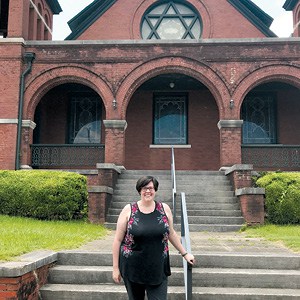Amy Milligan at Temple Mishkan Israel.
Prior to coming to Old Dominion University, I taught at Elizabethtown College in central Pennsylvania. It was there that I met one of my dearest friends, also named Amy, who is one of the college chaplains. When she told me that she was taking her students on an interfaith Civil Rights trip, I challenged her to find the Jewish voice, and she did. Three years ago, she sent me a text message from the pews of Temple Mishkan Israel in Selma, Alabama. It simply said, “You have got to meet these folks. You will love them.”
That small text turned out to be far more significant than either of us could have imagined; it was a message that would change my life for the better. As an academic, my research concentrates on the voices of marginalized Jews, especially with an eye to Jews who live in small communities. Although I am now part of Ohef Sholom Temple in Norfolk, my previous synagogue had only eight regular members (15, if we were lucky, on the holidays). So, when I heard that Temple Mishkan Israel had only four remaining members, I knew that, if nothing else, we would have a shared understanding of the struggles of small community life.
Jews have a long history in Selma, as the backbone of the local industry and downtown shops. There were even three Jewish mayors of the town. And then Selma was put on the map during the Civil Rights movement. I do not want to minimize the importance of what happened in Selma, the march, Bloody Sunday, Rev. Martin Luther King, Jr.’s speech, or the iconic image of King and Rabbi Abraham Joshua Heschel marching arm and arm from Selma to Montgomery. But I do want to suggest that this important moment of American history is not the entire story of the Jews of Selma.
Over the last two years I have been collecting the stories of the remaining Selmian Jews, their families and friends, and the community members who support them. It isn’t a story of sadness, as some might suggest, but rather a story of tenacity and hope. Their community includes a brave Korean War tank commander; a man who was recently named his university’s alumni volunteer of the year; someone whose family candy business filled the streets of Selma with the sweetest smells; and a retired educator who also is a talented musician.
The plight of closing congregations, especially in the South, is not new for Jews. But there is a certain magic that exists in these small congregations—a spark that many overlook. What is it that keeps a community together? How do we care for one another as we age and our community numbers diminish? Can we even pray without a minyan? Will anyone remember our community when we are gone?
In the moments when it is hardest to be a Jew, in the moments when it is easiest to give up hope, the Jews of Selma have continued on. They remain a committed community, caring for each other, and caring for their Selmian neighbors. They are examples of a real embodied Judaism, of the heart of living faithfully.
It has truly been my greatest privilege to be so warmly welcomed by Temple Mishkan Israel and by my “Selma family.” What was supposed to be a summer project has turned into so much more, and many of you have been following along with me as I work to preserve and tell the history of the Jews of Selma, Jews in the Civil Rights Movement, and of Jews in the South. I hope that my Hampton Roads Jewish community will continue to journey with me as we demonstrate that regardless of community size or location, we are all one.
If you are interested in learning more about the restoration efforts of Temple Mishkan Israel in Selma, Alabama, please follow: https://www.facebook.com/TempleMishkanIsrael/.
Amy K. Milligan, PhD is Old Dominion University’s Batten Endowed Assistant Professor of Jewish Studies and Women’s Studies and director, Institute of Jewish Studies and Interfaith Understanding. She may be reached at amilligan@odu.edu.
Amy K. Milligan, PhD

